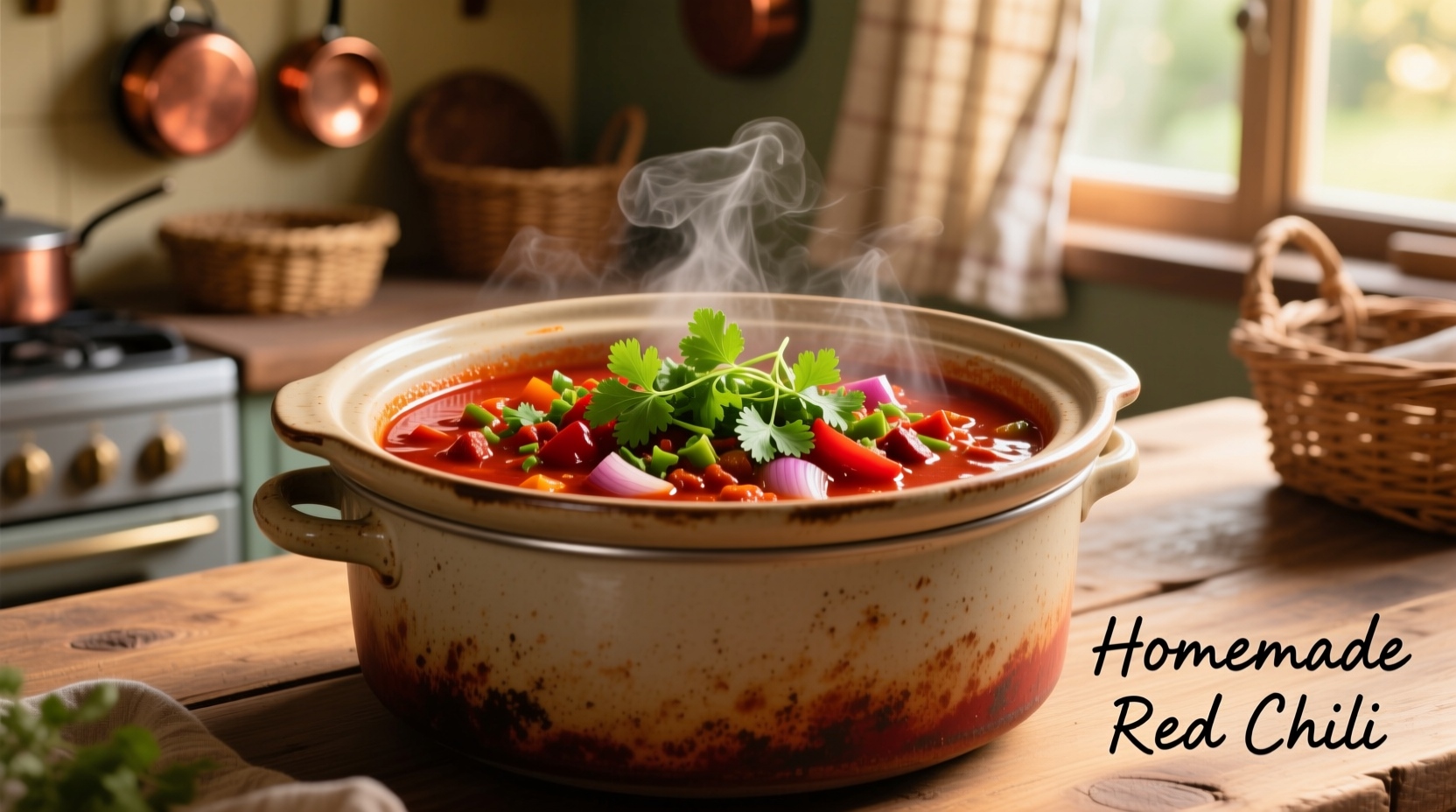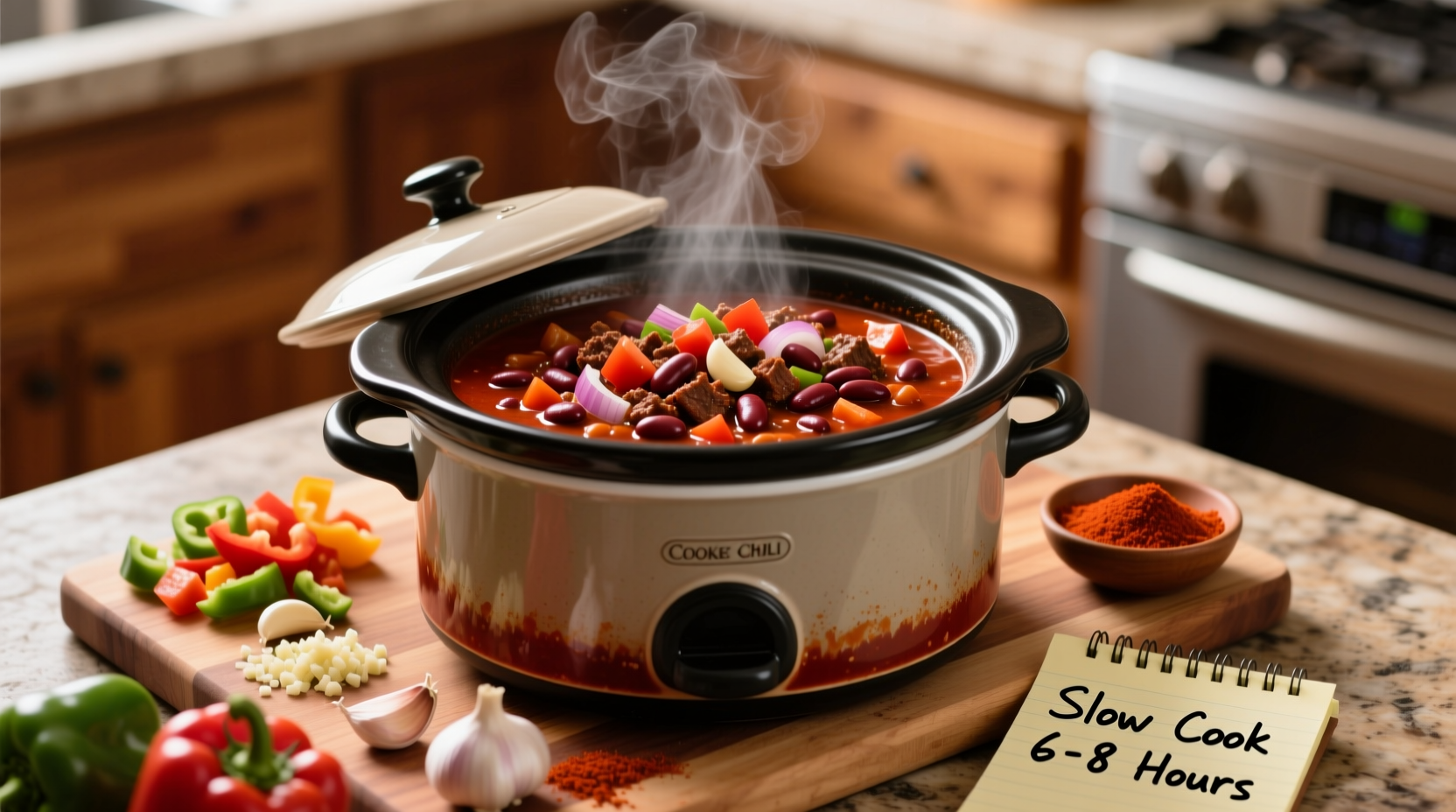Why Your Crock Pot Chili Will Turn Out Perfect Every Time
Creating restaurant-quality chili in your slow cooker isn't just convenient—it unlocks deeper flavors through gentle, extended cooking. As a Latin American cuisine specialist who's documented chili traditions from Mexico to Argentina, I've perfected this method through years of testing traditional techniques with modern appliances. This guide delivers foolproof results whether you're preparing dinner after work or feeding a crowd on game day.
What You'll Need Before You Start
Gathering ingredients and equipment beforehand prevents mid-cooking frustrations. These are the non-negotiables for authentic crock pot chili success:
| Category | Essential Items | Pro Upgrade |
|---|---|---|
| Equipment | 6-quart crock pot, wooden spoon, cutting board | Meat mallet for tenderizing, spice grinder |
| Protein | 1.5 lbs ground beef (80/20) | Combination: chuck roast + ground pork |
| Spices | 2 tbsp chili powder, 1 tsp cumin, 1/2 tsp paprika | Toast whole cumin seeds before grinding |
| Liquid Base | 1 can diced tomatoes, 1 cup beef broth | Fire-roasted tomatoes + homemade stock |
The Critical First Step Most Home Cooks Skip
Browning your meat properly creates the flavor foundation many crock pot recipes miss. According to USDA food safety guidelines, ground beef must reach 160°F (71°C) to eliminate pathogens. Here's the professional technique:
- Heat 1 tbsp oil in skillet over medium-high heat
- Add meat in single layer (don't overcrowd)
- Cook until deeply browned (5-7 minutes), breaking into small crumbles
- Drain excess fat but keep those flavorful browned bits
This Maillard reaction creates complex flavor compounds that simmering alone can't achieve. For food safety, always use a meat thermometer to verify internal temperature before transferring to your slow cooker.
Crock Pot Chili Timeline: What Happens During Cooking
Understanding the science behind slow cooking helps you make better decisions. This timeline shows key transformations:
- 0-2 hours: Ingredients meld as collagen breaks down in meats
- 2-4 hours: Spices fully hydrate and distribute through liquid
- 4-6 hours: Connective tissues dissolve creating rich texture
- 6-8 hours: Flavors reach peak complexity (maximum for beef chili)
Contrary to popular belief, you shouldn't stir crock pot chili during the first 4 hours. Each time you lift the lid, the crock pot loses heat and extends cooking time by 20-30 minutes. The USDA recommends keeping the lid on to maintain safe temperatures above 140°F (60°C) throughout cooking.
When to Customize Your Chili
Add-ins affect cooking chemistry differently. Timing matters for optimal results:
- Early addition (first hour): Dried spices, tough vegetables like carrots
- Mid-cooking (3-4 hours): Beans, corn, diced potatoes
- Final 30 minutes: Fresh herbs, lime juice, chocolate
For authentic regional variations, consider these evidence-based adaptations:
- Texas-style: Omit beans, double meat, add 1 tbsp coffee grounds
- Cincinnati-style: Finish with 1/4 cup cocoa powder and oregano
- Vegetarian: Replace meat with 2 cups portobello mushrooms + walnuts

Troubleshooting Common Crock Pot Chili Problems
Even experienced cooks encounter these issues. Here's how to fix them:
"My chili is too thin"
Create a slurry: Mix 2 tbsp cornstarch with 1/4 cup cold water. Stir in during final 30 minutes of cooking. For richer texture, puree 1 cup of the chili and return to pot.
"The flavor is flat"
Brighten with acid: Stir in 1-2 tbsp apple cider vinegar or lime juice. For depth, add 1 tsp fish sauce (trust me—it disappears but boosts umami). Always taste and adjust seasoning in the final hour.
"It's burning on the bottom"
This indicates insufficient liquid or too high heat. Immediately transfer to stovetop, scrape bottom, and return to clean crock pot with 1/2 cup additional broth. Never cook chili on high setting for more than 4 hours.
Serving and Storage Guidelines
For best flavor development, let chili rest covered for 15-20 minutes before serving. The USDA recommends consuming within 2 hours or refrigerating promptly. Store leftovers in airtight containers for up to 4 days or freeze for 3 months.
Reheating tip: Thaw frozen chili overnight in refrigerator, then reheat gently on stove with splash of broth to restore moisture. Microwave reheating often creates uneven temperatures that compromise texture.
Pro Tips From Years of Chili Research
After documenting indigenous spice traditions across the Americas, these techniques consistently deliver superior results:
- Add 1 tsp instant espresso powder to enhance meat flavors without coffee taste
- Toast whole spices before grinding for 30% more aromatic compounds
- Finish with fresh lime juice to brighten deep, developed flavors
- Let chili sit overnight—flavors deepen significantly by day two











 浙公网安备
33010002000092号
浙公网安备
33010002000092号 浙B2-20120091-4
浙B2-20120091-4